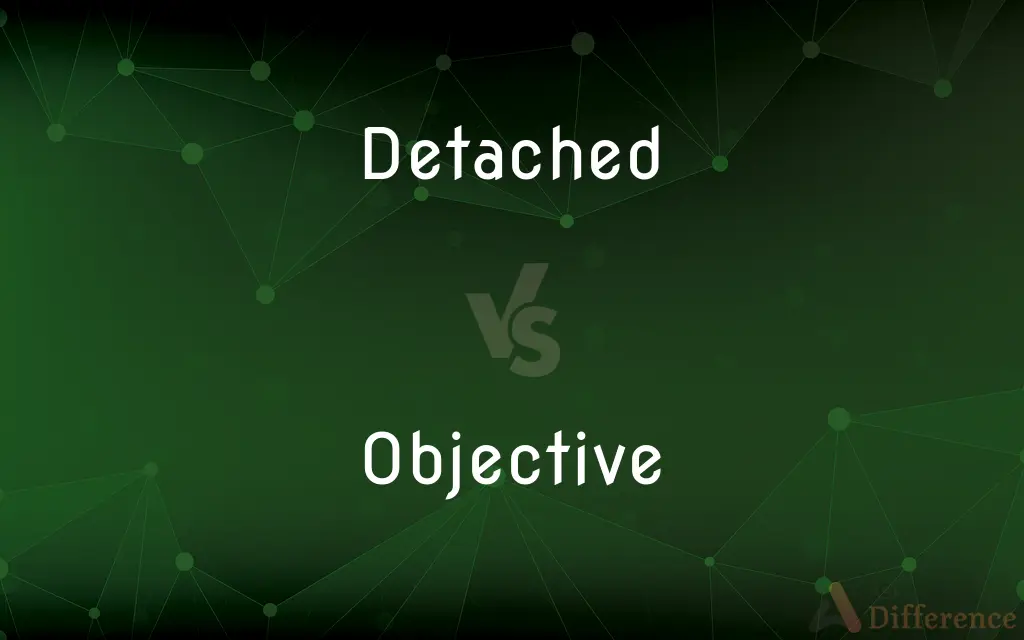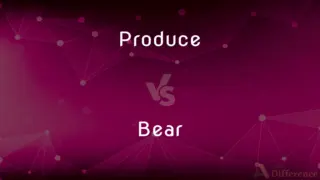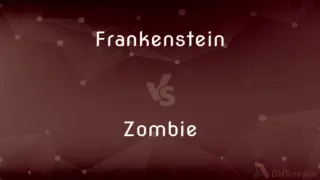Detached vs. Objective — What's the Difference?

Difference Between Detached and Objective
ADVERTISEMENT
Compare with Definitions
Detached
Separate or disconnected.
Objective
Existing independent of or external to the mind; actual or real
Objective reality.
Detached
Aloof and objective
He is a detached observer of his own actions
Objective
Based on observable phenomena; empirical
Objective facts.
Detached
Separated; disconnected
A detached part.
A detached plug.
ADVERTISEMENT
Objective
Uninfluenced by emotions or personal prejudices
An objective critic.
Detached
Standing apart from others; separate
A house with a detached garage.
Objective
A thing or group of things existing independent of the mind.
Detached
Marked by an absence of emotional involvement or personal interest; aloof or unbiased.
Objective
The objective case.
Detached
Not physically attached; separated from something it could connect to.
Objective
A noun or pronoun in the objective case.
Detached
Of a house: not joined to another house on either side.
Objective
The primary optical element, such as a lens or mirror, in a microscope, camera, telescope, or other optical instrument, that first receives light rays from the object and forms the image. Also called object glass, objective lens, object lens.
Detached
Having or showing no bias or emotional involvement; disinterested.
Objective
Of or relating to a material object, actual existence or reality.
Detached
Not influenced by anyone else; characterized by an impersonal objectivity; impartial.
Objective
Not influenced by the emotions or prejudices.
Detached
Simple past tense and past participle of detach
Objective
Based on observed facts; without subjective assessment.
Detached
Separate; unconnected, or imperfectly connected; as, detached parcels.
Objective
(grammar) Of, or relating to a noun or pronoun used as the object of a verb.
Detached
Showing lack of emotional involvement;
Adopted a degage pose on the arm of the easy chair
She may be detached or even unfeeling but at least she's not hypocritically effusive
An uninvolved bystander
Objective
Of, or relating to verbal conjugation that indicates the object (patient) of an action. In linguistic descriptions of Tundra Nenets, among others.
Detached
Being or feeling set or kept apart from others;
She felt detached from the group
Could not remain the isolated figure he had been
Thought of herself as alone and separated from the others
Had a set-apart feeling
Objective
A material object that physically exists.
Detached
No longer connected or joined;
A detached part
On one side of the island was a hugh rock, almost detached
The separated spacecraft will return to their home bases
Objective
A goal that is striven for.
Detached
Used of buildings; standing apart from others;
Detached houses
A detached garage
Objective
(grammar) The objective case.
Detached
Not fixed in position;
The detached shutter fell on him
He pulled his arm free and ran
Objective
(grammar) a noun or pronoun in the objective case.
Objective
The lens or lenses of a camera, microscope, or other optical device closest to the object being examined.
Objective
Of or pertaining to an object.
Objective
Of or pertaining to an object; contained in, or having the nature or position of, an object; outward; external; extrinsic; - an epithet applied to whatever is exterior to the mind, or which is simply an object of thought or feeling, as opposed to being related to thoughts of feelings, and opposed to subjective.
In the Middle Ages, subject meant substance, and has this sense in Descartes and Spinoza: sometimes, also, in Reid. Subjective is used by William of Occam to denote that which exists independent of mind; objective, what is formed by the mind. This shows what is meant by realitas objectiva in Descartes. Kant and Fichte have inverted the meanings. Subject, with them, is the mind which knows; object, that which is known; subjective, the varying conditions of the knowing mind; objective, that which is in the constant nature of the thing known.
Objective has come to mean that which has independent existence or authority, apart from our experience or thought. Thus, moral law is said to have objective authority, that is, authority belonging to itself, and not drawn from anything in our nature.
Objective
Unbiased; unprejudiced; fair; uninfluenced by personal feelings or personal interests; considering only the facts of a situation unrelated to the observer; - of judgments, opinions, evaluations, conclusions, reasoning processes.
Objective means that which belongs to, or proceeds from, the object known, and not from the subject knowing, and thus denotes what is real, in opposition to that which is ideal - what exists in nature, in contrast to what exists merely in the thought of the individual.
Objective
The objective case.
Objective
The goal intended to be attained (and which is believed to be attainable);
The sole object of her trip was to see her children
Objective
The lens or system of lenses nearest the object being viewed
Objective
Undistorted by emotion or personal bias; based on observable phenomena;
An objective appraisal
Objective evidence
Objective
Serving as or indicating the object of a verb or of certain prepositions and used for certain other purposes;
Objective case
Accusative endings
Objective
Emphasizing or expressing things as perceived without distortion of personal feelings or interpretation;
Objective art
Objective
Belonging to immediate experience of actual things or events;
Concrete benefits
A concrete example
There is no objective evidence of anything of the kind
Share Your Discovery

Previous Comparison
Produce vs. Bear
Next Comparison
Frankenstein vs. Zombie















































